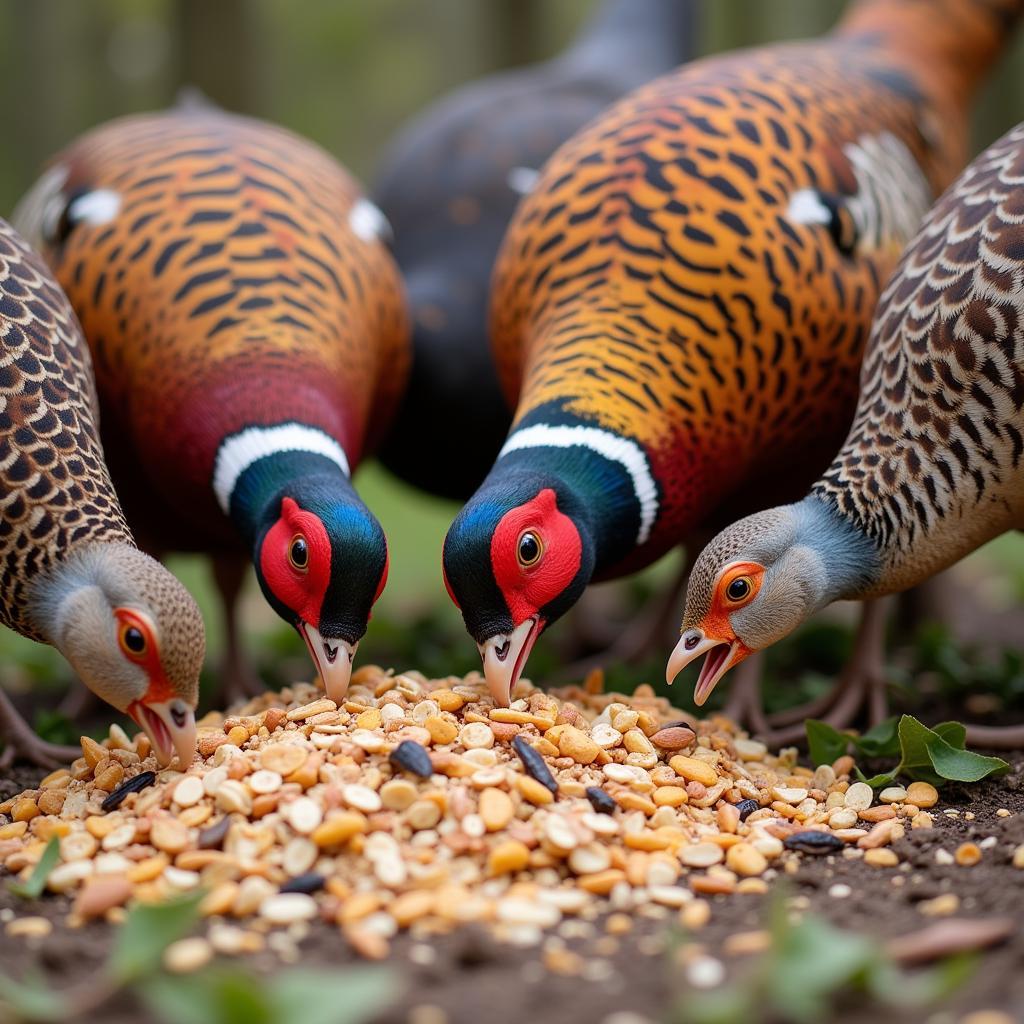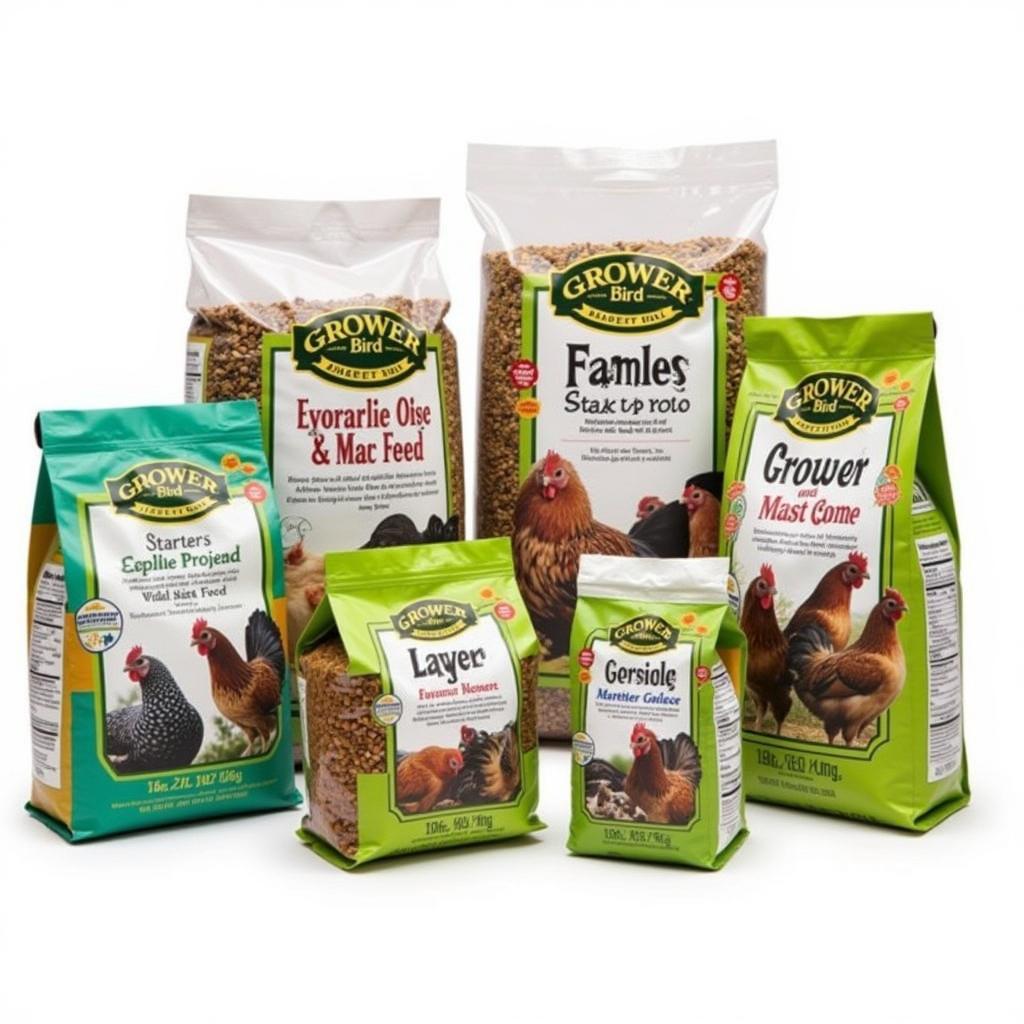Understanding the dietary needs of game birds is crucial for their health, breeding success, and overall well-being. Whether you’re raising pheasants, quail, or wild turkeys, providing them with the right Game Bird Food is essential. This comprehensive guide will explore the nuances of game bird nutrition, helping you make informed decisions about what to feed these fascinating creatures.
The Importance of a Balanced Diet for Game Birds
Just like any other animal, game birds thrive on a balanced diet that caters to their specific nutritional requirements. A diet lacking in essential nutrients can lead to various health issues, including poor growth, weak immune systems, and reduced egg production.
 Game Birds Enjoying a Nutritious Meal
Game Birds Enjoying a Nutritious Meal
Nutritional Needs of Game Birds: A Closer Look
Game birds need a diet rich in protein, carbohydrates, fats, vitamins, and minerals. Let’s break down each of these components:
- Protein: Crucial for muscle development, feather production, and egg laying. Young, growing birds and laying hens have particularly high protein needs.
- Carbohydrates: Provide energy for daily activities. Grains like corn, wheat, and oats are excellent sources of carbohydrates.
- Fats: Essential for energy storage and insulation. Seeds, nuts, and insects provide healthy fats.
- Vitamins and Minerals: Play a vital role in various bodily functions, including bone health, immune system function, and metabolism.
Types of Game Bird Food
There are several types of game bird food available, each formulated to meet specific needs:
- Starter Feed: Designed for young chicks from hatching to around 6 weeks of age. It contains high protein levels to support rapid growth and development.
- Grower Feed: Suitable for birds from 6 weeks to maturity. It has a lower protein content than starter feed but still supports steady growth.
- Layer Feed: Formulated for laying hens, this feed is high in calcium and other nutrients crucial for egg production.
- Maintenance Feed: Suitable for adult birds that are not laying eggs. It provides balanced nutrition for overall health and well-being.
 Various Game Bird Feed Options
Various Game Bird Feed Options
In addition to commercial feeds, many game bird enthusiasts supplement their birds’ diets with treats like:
- Grains: Cracked corn, wheat, milo, and oats
- Seeds: Sunflower seeds, millet, and safflower seeds
- Fruits and Vegetables: Berries, chopped greens, and melons
- Insects: Mealworms, crickets, and earthworms
Choosing the Right Game Bird Food
Selecting the appropriate game bird food depends on several factors:
- Age: As discussed earlier, chicks, growing birds, and laying hens have different nutritional requirements.
- Species: While many game birds have similar dietary needs, some species may have specific preferences or requirements.
- Season: During the breeding season, game birds require a higher protein intake to support egg production.
“It’s crucial to adapt the game bird food to the specific needs of the birds you’re raising,” advises Dr. Emily Carter, a renowned avian veterinarian. “Factors like age, species, and even the time of year can significantly influence their dietary requirements.”
Tips for Feeding Game Birds
Here are some practical tips for feeding your game birds:
- Provide Fresh Water Daily: Clean, fresh water is as crucial as food. Ensure a constant supply, especially during hot weather.
- Offer Food in Clean Feeders: Dirty feeders can harbor bacteria and attract pests. Clean and disinfect feeders regularly.
- Don’t Overfeed: Overfeeding can lead to obesity and other health issues. Monitor your birds’ food intake and adjust accordingly.
- Introduce New Foods Gradually: Sudden dietary changes can upset a game bird’s digestive system. Introduce new foods gradually to avoid problems.
Common Questions About Game Bird Food
Q: Can I feed my game birds chicken feed?
While chicken feed may seem similar, it’s not ideal for game birds. Game bird-specific feeds are formulated to meet their unique nutritional needs.
Q: How much food does a game bird eat per day?
Food consumption varies depending on factors like age, species, and activity level. As a general guideline, adult game birds eat about 1/4 to 1/2 cup of food per day.
Q: How can I encourage my game birds to eat a variety of foods?
Offering a diverse selection of foods in separate feeders can encourage exploration. Gradually introducing new foods alongside familiar ones can also be helpful.
Conclusion
Providing your game birds with the right nutrition is vital for their health and happiness. By understanding their dietary needs and following the tips outlined in this guide, you can ensure your feathered friends live long, healthy lives. Remember, game bird starter food is crucial for young chicks. For those interested in creating a sustainable food source for game birds, exploring options like oats for food plots can be beneficial.
If you have any concerns about your game birds’ health or diet, consult with a qualified avian veterinarian for personalized advice.
Don’t hesitate to reach out to our team at Mina Cones Food for expert guidance on choosing the best game bird food. Call us at 02437655121, email us at minacones@gmail.com, or visit our location at 3PGH+8R9, ĐT70A, thôn Trung, Bắc Từ Liêm, Hà Nội, Việt Nam. We have a 24/7 customer support team ready to assist you!